I’m not sure why I first picked up a copy of Welcome To The Monkey House by Kurt Vonnegut, or what had compelled me to bring it on a family trip to Mexico in 1987. It’s likely that my mother, an avid avoider of sci-fi literature, was telling me to read the story, Harrison Bergeron because it transcended its genre limitations.
The book was a collection of Vonnegut’s short fiction that had appeared in magazines and other literary publications in the 1950’s and 60’s while Vonnegut’s reputation grew as an author. Within the volume are 25 short stories that qualify as sci-fi, comedy, mystery, adventure, and more.
Vivid characters with names like Doghouse Riley jumped from the page. Vonnegut sculpted worlds of varying complexity and reality to tug at the strands of the human condition. Whether we found ourselves in a smoky piano bar, the deepest recesses of space, or in the compound of a maniacal dictator, Vonnegut ferried us through ever-evolving tableaus with humor, and pathos.
Welcome To The Monkey House became a rosetta stone of narrative, language, and humanity for my young mind. The stories opened a well of curiosity that had been dormant, waiting to come alive. Vonnegut set the flame alight with his empathy, his wordplay, and his wit.
As school began in the fall of that year, I was turned on to a new video program on MTV called 120 Minutes. The show had begun airing late on Sunday nights in March of 1986, and aired music videos by underground and college rock bands like Depeche Mode, Sisters of Mercy, Echo & The Bunnymen, and many more.
The show aired from midnight to 2:00 am in the area where we lived. As much of a night owl as I was, I often struggled to stay awake, or awake enough to comprehend what I was seeing and hearing in the one o-clock hour. I quickly began taping the show each week on our VCR and would then rewatch it after school the following Monday.
By the time I began my junior year of high school in the autumn of 1987, I had this routine down to a veritable science.
One Monday afternoon in September of that year, I came home from school, grabbed a snack and wandered into the living room to turn on the TV and VCR. The screen popped on, and became alit. The TV was still turned to MTV from the midnight prior. I opened the VCR to ensure the tape had rewound to the beginning and started to push the tape back into its cradle to hit play.
Before any of that could happen, my attention had been pulled firmly and completely from the task at hand. I watched as a woman sat in a wooden kitchen chair, and a man rested his head forlornly in her lap. Fireworks exploded across the screen in double exposure.
The song was driven by an urgent snare drum, a distorted guitar ringing out in spare, arpeggiated chords, and the clean, high voice powerfully dedicating the tune to his love, or so it seemed.
’The One I Love’ by R.E.M. struck all of the same chords for me as Vonnegut had a few months earlier. Here was what seemed to be a typical love song like you have heard thousands of times. But as Michael Stipe careens, “This one goes out to the one I love”, something is amiss.
This was a love that was acrid and unhealthy. The narrator refers to his love as a “prop” to occupy his time. It is a song of an abusive relationship, and the ugly side of love. Yet, when people heard it they associated all of the same love song tropes despite it being a song about love in a much more unconventional and unhealthy way.
R.E.M. and Kurt Vonnegut had both taken long-established forms of art, the love song and the short story and turned them their heads. They used wit, and the subtle reversals of tropes to lend new meaning to stories we thought we already knew.
I was fifteen and had no idea what I wanted for a career, but I knew that I wanted my future to involve telling stories in unusual ways like this. Like Vonnegut and R.E.M., I longed to turn an art form on its head. I endeavored to make music that told stories, and opened up new ideas within old forms.
‘Better Off Like This’ was the last song I submitted for our sessions for the Ways To Hang album. At first, it seemed that the song might be too late. We had fourteen or fifteen songs in the can, and while the track was good and we played it well from the offing, it seemed a last minute add that was unnecessary. The tune could easily be saved for the next album, or released as a single.
Being very excited about the song and having the opportunity to record the track ourselves and with no additional costs for studio time, I pushed for us to record it even if we didn't use it right away.
Katie, the song’s protagonist is a seventeen year old working to support her and her tween brother, Isaac. Whip smart, defiant, and fiercely independent Katie plays the bad hand she has been dealt with steely determination and a keen observational eye.
Dad has been out of the picture for the duration, and within the last year, their mother has split as well. Left on their own, they make ends meet while Katie works at a local bar and finishes her diploma. It’s a threadbare existence, but their lives have improved by one other subtraction; the exit of their mother.
With an eye on being a writer, Katie takes in all of the goings on at her watering hole gig. She and Isaac subsist on the cheapest of food stuffs and make their way to school, work and the store through a series of bus stops and interminable walking.
Like Vonnegut’s stories, or ‘The One I Love’, I wanted to take a situation that seemed dire and see it as a step forward. Sure, a mother has abandoned her children, but Katie is far more equipped to be a mother to Isaac than her own mother is.
Over my career selling graduation announcements and caps and gowns, I met so many kids that were succeeding in spite of the world in which they lived. Kids that slept in cars, floated on random couches, and wondered where their next meal might come from. All the while, so many of these students were excelling academically and athletically.
I learned about students overcoming long odds, and living in terrible circumstances who were going on to graduate high school, entering college, winning scholarships, and the entering workforce. There were kids thriving in abhorrent conditions.
All of these stories elicited a sympathy and admiration from those that heard it. The default setting seemed to be to marvel at how a mother might leave her child as Katie has been left.
What we often do not or cannot see is that in some moments, kids like Katie are better off like this, without a parent to get in the way and make things even harder. It’s an awful reality in our world, but some folks are not capable of being involved parents.
It’s hard to know if this will become the trauma that makes Katie successful in her life, or if it is a coping mechanism that will saddle her with untold trauma that she will never overcome. Perhaps it’s a bit of both.
Katie is both the heroine and the victim of our story. And that, that seems awfully Kurt Vonnegut.
Cheers,
Matty C










Share this post